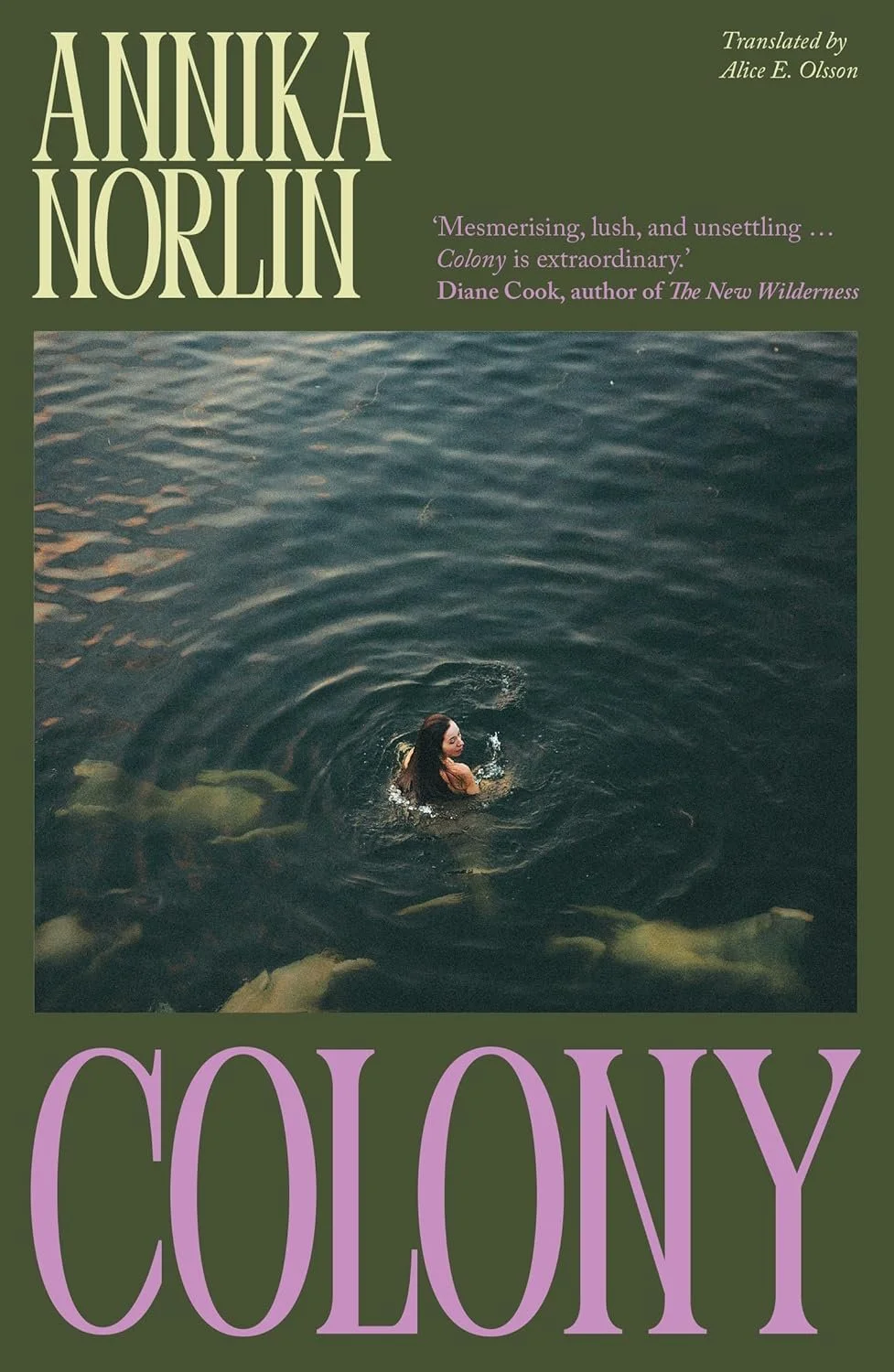Colony by Annika Norlin trans. by Alice E. Olsson
“There was something about the way they interacted with each other, no chit-chat, just the stillness and the thanking. Complete silence, and their bodies pressed against each one another by the fire, like there was no distance between them. A closeness that made me wonder if they had been through something terrible.”
The Colony (Scribe, 2025) is the debut novel by Swedish-born musician and writer Annika Norlin. Norlin has won considerable accolades for her music, and The Colony has already picked up several notable literary prizes. Translated from Swedish to English by Alice E. Olsson, it is set to be published in fifteen language.
It starts by introducing us to Emelie, a burnt-out city journalist as she arrives at a crossroads. She feels down, disappointed, and exhausted. She’s not quite sure what her next steps in life should be, but she knows she can’t continue living as she is.
“You don’t reflect on being irritated. You think it’s justified. You snap at an old man on an escalator for walking too slowly. You get annoyed with your sister for calling and asking how you’re doing; you don’t have time to talk, and now you feel guilty on top.”
So, instead, she decides to hit pause. She sublets her apartment, packs up some essentials and drives out to the country to a place from her childhood. Without any real plan, she hopes to camp for a few nights and see what unfolds. She finds a quiet, secluded spot at the top of a hill and waits – for what she isn’t sure.
In the process of waiting, she begins to notice a group of people who are behaving oddly. From her vantage point on the hill, she observes them and how they do everything as a group: how they thank the earth, the trees, the animals they eat, the way they sing together without words, and dance by the lake. The group seems to have no core characteristics tying them together – they’re all of different ages and genders, and seem to be dressed in regular clothing. Emelie becomes consumed with observing them:
“I noticed now that I had started to wait for them, longing to see them. The way they stood in the water and washed each other. The stillness. The aimlessness.”
There is one who stands out more in the group: a teenage boy, Låke, who always seems to be on the edges, walking further behind the others and sitting away from them when they eat. Emelie immediately feels pity for him and his seeming exclusion, dubbing him “Poor Bastard”
From here, Norlin moves the narrative between past and present, visiting the backstories of each group member in turn, exploring their history and how and why they’ve ended up living a bucolic life off-grid with other misfits in the middle of a forest. Of the seven in the group, three are hiding from legal repercussions, and all are complicit in benefits fraud. The ‘leader’ Sara is positioned as the ‘Queen’, so to speak, of the ‘Colony’, and Norlin sets her up to have cult leader-like qualities, but they’re never fully realised. The more we learn about each member of the colony, the more we’re asked to suspend our disbeliefs about the group's existence.
Norlin introduces a number of important themes, including ecology, burnout, social living and group dynamics, which I found myself eagerly waiting for her to explore more intensely through the group's motives and identities, but it never fully arrived. Most of the book is dedicated to the characters' backstories, leaving little to fully unpack about the group and their existence in the present and even less opportunity to explore Emelie’s presence when she finally makes contact and provisionally joins the group. We’re left with a somewhat messy, whirlwind ending that feels like Norlin has tried to tie things up ‘happily ever after’ but that just doesn’t quite fit.
“All the worthless things I had done in my life hitherto, everything that hadn’t led anywhere, everything that had only revolved around myself. This was the moment I would step forward.”
The Colony has the bones of a great story that starts strong and slowly loses its way the further you read. I started it engaged and eager to find out what would happen. The chapters are short, and there is a strong voice throughout, especially for Emelie and Låke. But about a third of the way through, the structure becomes repetitive, and there’s no meaty pay-off.
The group does not intentionally choose to live life differently; rather, they are simply avoiding their responsibilities and the consequences of past decisions. While their backstories are richly developed, there isn’t enough to bring it all together, and the weak ending lets down the overall impact for this reader.
Elaine Chennatt is a writer, educator and psychology student currently residing in nipaluna. She has a special interest in bibliotherapy (how we use literature to make sense of our lives) and is endlessly curious about the creative philosophies of others. She lives with her husband and two bossy dachshunds on the not-so-sunny side of the river (IYKYK). Find her online at wordswithelaine.com.
